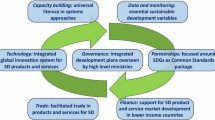Abstract
Integrated Water Resource Development and Management (IWRM) was the paradigm recommended for water resource management at the UN Conference on Environment and Development (UNCED) in Rio de Janeiro in 1992. Subsequently, however, “development” disappeared from the IWRM lexicon and the Dublin Principles, a preconference lobbying product, were widely promoted instead. A review of case studies suggests that the normative approach of Dublin has constrained infrastructure investments in developing countries, often ignoring the context within which water resources are managed. As a result, its positive outcomes have been limited. Meanwhile, in countries following the Rio approach, water management has made significant contributions to broad development objectives. It is suggested that a return to the UNCED agreement is needed to address effectively the challenges to water management posed by economic transformation, population growth and climate change.
Similar content being viewed by others
Notes
See for example the review undertaken by UN Water for the Commission on Sustainable Development which sought to develop a checklist approach to review progress on the development of IWRM and water efficiency plans (UN-Water (2008). Status Report on IWRM and Water Efficiency Plans for CSD16)
References
Ariyabandu R (2008) Swings and roundabouts: a narrative on water policy development in Sri Lanka. Working Paper 296, Overseas Development Institute. London, November 2008. http://www.odi.org.uk/resources/odi-publications/working-papers/296-water-sanitation-policy-sri-lanka-poverty-development.pdf
Water Management Authority (2009) Water resources management authority. Integrated water resources management and water efficiency plan for Kenya, Nairobi, 2009
Biswas AK (2004) Integrated water resources management: a reassessment. Water Int 29:248–256
Biswas AK (2008) Integrated water resources is it working? Water Resour Dev 24(1):5–22
Biswas AK, Tortajada C (eds) (2004) Appraising the concept of sustainable development: water management and related environmental challenges. Oxford University Press, Oxford
Brown C, Lall U (2006) Water and economic development: the role of variability and a framework for resilience. Nat Resour Forum 30(4):306–317
Caponera DA (1992) Principles of water law and administration. Balkema, Rotterdam
Comprehensive Assessment of Water Management in Agriculture (2007) Water for food, water for life: a comprehensive assessment of water management in agriculture. London and Colombo, Earthscan and International Water Management Institute
Conca K 2002, The World Commission on Dams and trends in global environmental governance. Polit Life Sci • March 2002 • vol. 21, no. 1 accessed at politicsandthelifesciences.org/Contents/.../PLS2002-3-6-HS1all.pdf, 8 Sep 2009
Drezner (2008) All politics is global. Princeton University Press, New Jersey
Dukhovny, W (2004) In: Discussion Notes: Biswas AK (2004) Integrated Water Resources Management: A Reassessment. Water International, 29(2) pp 248–256 & Water International, 9(4) pp 530–535
Eritrea Ministry of Land (2008) Water and Environment Water Resources Department, Action Plan for Integrated Water Resource Management (IWRM) in Eritrea, Asmara
Grey D, Sadoff CW (2006) Water for Growth and Development. (in) Thematic Documents of the IV World Water Forum. Comision Nacional del Agua: Mexico City
Grey D, Sadoff CW (2007) Sink or swim? Water security for growth and development. Water Policy 9(6):545–571
GWP (2003) Integrated water resources management (IWRM) and water efficiency plans proposed brief guide on preparation of IWRM Plans. Global Water Partnership, Stockholm, 2003
GWP (2007a) Integrated Water Resources Management (IWRM) and Water Efficiency Plans, Proposed brief guide on preparation of IWRM Plans—A perspective of the Global Water Partnership—GWP) accessed at /pawd/docs/iwrm plan brief description (emphasis added)
GWP (2007b) Triggers of Change GWP Technical Committee, Triggering change in water policies POLICY BRIEF 8, Stockholm 2007
ICWE (1992) The Dublin statement on water and sustainable development. International Conference on Water and the Environment (ICWE), Dublin, 1992
IEG (2009) Approach paper IEG evaluation of bank group support for water. Independent Evaluation Group, World Bank, Washington
IMF (2007) Uganda: 2006 Article IV consultation and staff report for the 2006 Article IV consultation. IMF, Washington
SWECO International (2008) Case study: Pungwe River Basin in Mozambique. Training Material in Integrated Water Resources Management for River Basin Organisations, Swedish International Development Cooperation Agency (Sida)/Cap-Net, Stockholm 2008
Jeffrey P, Kabat P (2003) Integrated water resources management: a post-natal examination, contributed paper to the discussion about Methods for Integrated Water Resources Management (MIWRM) and Transboundary Issues as a part of EC FP6 programme topic II.3.1—Integrated water management at catchment scale
Lenton and Muller (2009) IWRM in practice: better water management for development. Earthscan, London, 2009
Medema W, Jeffrey P (2005) IWRM and adaptive management: synergy or conflict? NeWater, Deliverable 1.1.1. Osnabruck, 2005
Saleth RM, Dinar A (2005) Water institutional reforms: theory and practice. Water Policy 7:1–19
Ssemogerere (2005) Productivity performance in developing countries, country case studies, Uganda, UNIDO, Vienna
UN (1977) Report of the United Nations Water Conference Mar del Plata. E/CONF.70/29, New York (accessed at http://www.cohre.org/store/attachments/RWP%20-%20Mar%20del%20Plata1.pdf, September 2009)
UNCED (1992) Agenda 21. UN Conference on Environment and Development, Rio de Janeiro
World Bank (2007) UG—Private Power Generation Project PROJECT INFORMATION DOCUMENT (PID) Report No.: 43529 World Bank, Washington
World Bank (2009) Mohamed El Hedi Louati and Julia Bucknall, Tunisia’s Experience in Water Resource Mobilization and Management in Water in the Arab World:Management Perspectives and Innovations, Jagannathan NV, Mohamed AS and Kremer A (Editors), World Bank, Washington, (pp 157–180)
WSSD (2002) Plan of implementation of the world summit on sustainable development. United Nations, Johannesburg
Author information
Authors and Affiliations
Corresponding author
Rights and permissions
About this article
Cite this article
Muller, M. Fit for purpose: taking integrated water resource management back to basics. Irrig Drainage Syst 24, 161–175 (2010). https://doi.org/10.1007/s10795-010-9105-7
Published:
Issue Date:
DOI: https://doi.org/10.1007/s10795-010-9105-7




